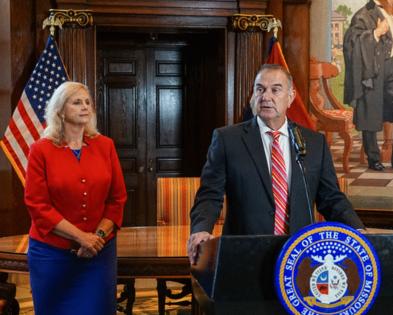Missouri seeks go-ahead from feds to ID Chinese assets it can seize
Published in News & Features
JEFFERSON CITY, Mo. — Missouri Attorney General Catherine Hanaway said Wednesday her office is awaiting the go-ahead from the U.S. State Department to begin identifying Chinese properties to seize to satisfy a $24 billion judgment against the country.
Hanaway, in comments to reporters, said her office expects to receive approval from the U.S. Department of State in the first quarter of next year to begin identifying real estate owned by China or a Chinese-based corporation.
Once that occurs, “We will start the seizure process,” she said.
The news comes a day after Hanaway's office said the attorney general remains committed to collecting on a $24 billion judgment in favor of Missouri and against Chinese government defendants in April.
The Chinese government responded in a statement to the Post-Dispatch on Tuesday, with a spokesperson asserting China has the right to take "reciprocal countermeasures" in response to "the so-called lawsuits and judgments from the U.S."
"The so-called pandemic compensation lawsuits fabricated by certain forces in the U.S. ignore basic objective facts and violate fundamental legal principles; they are purely malicious frivolous lawsuits and political manipulation, with extremely sinister intentions," China's U.S. Embassy spokesperson Liu Pengyu said in a statement. The Chinese government will not "accept any so-called default judgments," the statement reads.
In April, a federal judge in Cape Girardeau ordered the Chinese government to pay $24 billion to Missouri after finding it hoarded personal protective equipment during the COVID-19 pandemic.
The procedure to seize assets, which could take years, would look at property both inside and outside of the state.
“We’re not just looking in Missouri. We are looking nationwide,” Hanaway said.
Once seized, the properties would be sold to compensate the state. Hanaway said the state has not yet identified specific properties. “We’re still developing the list,” she said.
A timeline for recovering the settlement also is unknown because the process likely will play out in courtrooms across the nation over a lengthy period of time.
“This is going to be an onerous process,” Hanaway said.
She said she has had suggestions that the state seize pandas on loan from China to U.S. zoos, but said that is not a focus of her office. “I don’t think we could sell the pandas,” she said.
Hanaway said recovering the money is important to the state. “We think the state was damaged (by China’s actions) as a result of the pandemic,” Hanaway said.
Pengyu said that since the outbreak of COVID-19, the Chinese government has "adhered to the principle of putting people and their lives first, working hand in hand with countries around the world to overcome difficulties and making significant contributions to international cooperation in the fight against the pandemic."
The state's lawsuit was filed by then-Attorney General Eric Schmitt in 2020.
Senior U.S. District Judge Stephen Limbaugh Jr. in 2022 tossed the suit, but an appeals panel ruled in 2024 that one of the state’s claims could proceed — that the defendants hoarded personal protective equipment while suppressing the dangers of COVID-19.
In April, Limbaugh said in a 32-page order that Missouri showed defendants violated federal law against monopolization or attempted monopolization of trade.
He said the state’s evidence showed defendants “engaged in monopolistic actions to hoard PPE through both the nationalization of U.S. factories and the direct hoarding of PPE manufactured or for sale in the United States.”
Limbaugh said Missouri claimed $123 million in damages in the form of heightened PPE expenditures between April 22, 2020 and the end of 2020.
Missouri also claimed $8.04 billion in lost tax revenue due to the hoarding. Added together, Missouri’s claimed damages exceeded $8.16 billion, and the state is entitled to a judgment valued at three-times that amount, Limbaugh said.
Pengyu asserted that U.S. courts have no jurisdiction in the matter.
“Based on the principle of sovereign equality of states under international law, the epidemic prevention and control policies and measures adopted by the Chinese government at all levels are acts of national sovereignty and are not subject to the jurisdiction of US courts," he said in the statement.
Constance Wagner, director of the Center for International and Comparative Law at St. Louis University, said Missouri may find it difficult to enforce the judgment against China.
"The legal doctrine of foreign sovereign immunity can shield foreign countries from domestic legal proceedings," she said in an email Wednesday. "In the United States, this principle is governed by federal legislation called the Foreign Sovereign Immunities Act (FSIA).
"The FSIA addresses both immunity from suit and immunity from execution of a judgment entered against a defendant in a lawsuit," she said.
She said the defendants could move to set aside the judgment based on procedural issues or under FSIA unless Missouri can show assets are not immune from seizure.
She added there may not be any property in the United States to satisfy the judgment.
"The judgment is enforceable only against assets owned by the named defendants. Missouri cannot execute its judgment against property in the United States just because it is Chinese-owned," she said.
Chinese-owned Smithfield Foods, a leading pork processer, owns an estimated 40,000 acres of Missouri farmland.
Even though the company owns farmland here, Smithfield's property cannot be seized to satisfy the judgment "because it is owned by a private Chinese conglomerate and Smithfield Foods was not a defendant in this action," Wagner said.
____
© 2025 the St. Louis Post-Dispatch. Visit www.stltoday.com. Distributed by Tribune Content Agency, LLC.







Comments